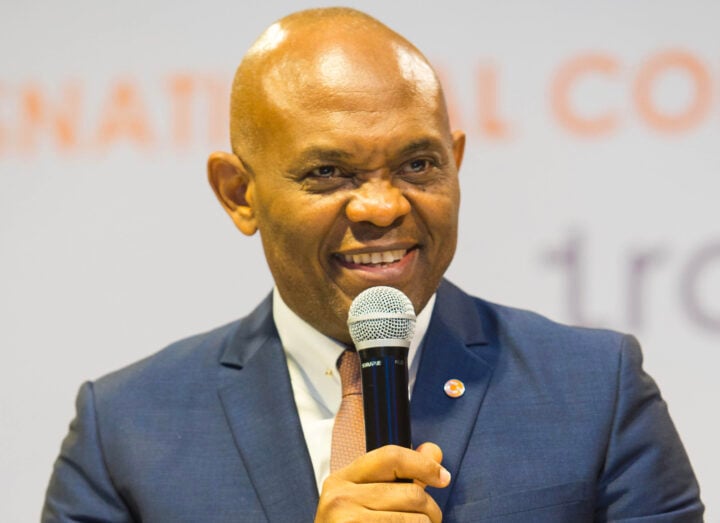At the World Bank and International Monetary Fund (IMF) Annual Meetings, Tony Elumelu, Chairman of the UBA Group, called for deeper collaboration between African governments, global financial institutions, and private sector leaders to break the structural barriers limiting the continent’s participation in the Artificial Intelligence (AI) revolution.
Speaking during a high-level session themed “Boosting Productivity Growth in the Digital Age,” where he shared the stage with IMF Managing Director Kristalina Georgieva, Elumelu stressed that Africa must not be left behind as AI reshapes global economies.
“AI should democratize prosperity, not deepen inequality,” he said. “For Africa to benefit, we must urgently address the infrastructure and capital deficits that hold back our innovators.”
AI and the Urgency of Fixing Africa’s Structural Gaps
Elumelu described AI as a transformative force capable of redefining productivity and opportunity, but warned that its impact on Africa will depend on how quickly the continent overcomes its foundational challenges.
“Access to reliable electricity and affordable capital are the twin engines of technological progress,” he noted. “Without them, Africa risks being a spectator in the AI race.”
He called for “therapy-level interventions”—coordinated policies, strategic funding, and investment in critical infrastructure—to enable African economies to harness AI’s potential for inclusive growth.
According to him, solving these systemic issues requires joint commitment from both the public and private sectors, as well as global partners like the IMF and major tech corporations.
Empowering Africa’s Youth Through Technology
Elumelu, who also heads the Tony Elumelu Foundation (TEF), highlighted the Foundation’s collaborations with Google and other global partners aimed at equipping young African entrepreneurs with the digital skills and tools needed to thrive in the AI-driven economy.
“Africa’s youth are ready,” he said. “They’re bold, creative, and hungry for change. What they lack is access and opportunity. Once we remove those barriers, they will lead the continent’s digital transformation.”
He urged governments to focus less on direct intervention and more on creating an enabling environment, noting that local entrepreneurs are ready to invest their own resources when institutional and regulatory frameworks are supportive.
AI’s Global Implications: A Warning from the IMF
Adding a global perspective, IMF Managing Director Kristalina Georgieva warned that AI could redefine labor markets and widen inequality if not managed inclusively.
She projected that 26% of jobs in low-income countries could be disrupted by AI, compared to 40% in emerging markets and 60% in advanced economies, underscoring the urgency of building adaptive policies for workforce transformation.
“AI will either become a force for convergence or a driver of division,” Georgieva cautioned.
Nigeria’s Economic Outlook and Reform Commitments
Meanwhile, Central Bank of Nigeria (CBN) Governor Olayemi Cardoso revealed that Nigeria’s trade surplus has climbed to 6% of GDP, signaling a gradual improvement in macroeconomic balance.
Cardoso, speaking through the Ministry of Finance’s statement in Washington, reaffirmed the administration’s focus on disciplined fiscal and monetary management as a pathway to sustained growth and inflation control.
He also disclosed that the CBN is designing a framework for currency swap arrangements with other countries to ensure mutual economic benefits.
“Sound policies and credible reforms are the foundation of growth,” Cardoso said. “We are pursuing fiscal discipline and financial innovation side by side.”
Strengthening Global Partnerships
Nigeria’s Minister of State for Finance, Doris Uzoka-Anite, reiterated the government’s commitment to deepening engagement with international financial institutions and development partners.
Speaking at the G-24 meeting, she emphasized Nigeria’s determination to build a resilient, inclusive economy through strategic partnerships and forward-looking policies.
“Our participation here reflects Nigeria’s commitment to sustainable growth through collaboration, innovation, and accountability,” she stated.
A Shared Vision for Africa’s Digital Future
The discussions at the World Bank/IMF meetings underscored a unifying message: Africa’s AI journey will depend not just on technology but on partnership.
As Elumelu noted, the continent’s success lies in collective action—governments enabling, institutions supporting, and entrepreneurs innovating—to turn Africa’s immense potential into global competitiveness.

